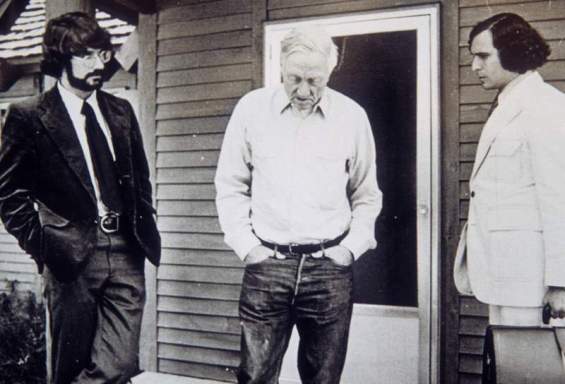Why a film about William O. Douglas now?
This is a story with a national footprint and issues that radiate far beyond U.S. borders. The wilderness ethic and protection of wild lands have become defining issues across the planet. Douglas often used a metaphor of the natural world to underpin the rights of individuals. These rights were not self-implementing, he said, and his words implored people to be ever-vigilant.
“It took the political skills of William Brennan and a liberal majority to make Douglas’s views law. But the Supreme Court’s privacy revolution in the 1960s and 1970s was intellectually the work of Douglas and his constitutional theory.”
— Noah Feldman, in his 2011 book Scorpions, which was named 2011 legal book of the year by Scribes, the American Society of Legal Writers.
“He was our greatest environmental jurist. There is nobody in American history that I more admire than him. What he understood, which is what I think more and more people are understanding, is that protecting the environment is not about protecting the fishes and the birds for their own sake. It’s about recognizing that nature is the infrastructure of our communities, and we must meet our obligation as a generation, as a civilization, as a nation, to create communities for our children that provide them with opportunities for dignity and enrichment and good health.”
— Robert F. Kennedy Jr. speaking about William O. Douglas at the Sierra Summit, September 10, 2005
“Whether it’s a painting, or a song, or a film, a work of art can nudge us to a new way of seeing, and sometimes even to a new way of being.”
— Robert Redford
Where can I watch the FILM?
Find the 12-minute version on Vimeo, or watch below:
How can I get in touch?
Email john@williamodouglasfilm.com, tweet the project @WODouglasfilm, or use the contact form on this website.
Do you host screenings?
The William O. Douglas Film Project has a completed 12-minute version of Liberty & Wilderness that has been unanimously well-received at film festivals, conferences, and organizational programs. This compelling prologue to the finished film is an excellent standalone, or as a part of any relevant program.
Where have you held past screenings?
- The University of Oregon School of Law: Eugene, OR
- Eugene International Film Festival: Eugene, OR
- Astoria International Film Festival: Astoria, OR
- 75th Anniversary Celebration of the Appointment of William O. Douglas to the Supreme Court: Washington, D.C.
- Wilderness Act at 50, Mazamas Summit Conference: Portland, OR
- Wilderness Act at 50, National Wilderness Society Film Gala: Albuquerque, NM
- Wilderness Act at 50, National Wilderness Conference: Albuquerque, NM
- Washington State History Museum: Tacoma, WA
- William O. Douglas National Historic Trail Inauguration: Yakima, WA
- William O. Douglas Federal Courthouse Centennial Celebration: Yakima, WA
- Wilderness Act at 50, Lewis & Clark Environmental Law School Symposium: Portland, OR
- McMenamins Kennedy School History Pub: Portland, OR
Where would this film be available if it is produced?
Numerous streaming services and on-demand cable options have a tremendous growth factor and present an exceptional opportunity for distribution of Liberty & Wilderness.
Are there any other offerings besides the film that the project hopes to produce?
Our website offers a robust array of material that is free and downloadable, including a study guide on public lands. The project hopes to offer more educational material such as this, enabling educators and students to consume information in small bites.
Are there similar documentaries to Liberty & Wilderness out there?
The 2018 documentary RGB that explores the legacy of Supreme Court Justice Ruth Bader Ginsburg grossed $14 million worldwide, demonstrating the great potential for films like this. The judicial wing of the U.S. government continues to play an ever-increasing role in American politics. With this growing power, so too grows an audience interested in learning its stories and history.
How can I donate?
Visit http://williamodouglas.org/donate/
Is my donation tax-deductible?
Yes, the Oregon Cultural Heritage Commission (OCHC) is a 501(c)(3) not-for-profit educational organization, established in 1993.
Where else can I learn more about William O. Douglas?
The Library of Congress collection includes over 600,000 items in the William O. Douglas papers. The Supreme Court Historical Society has voluminous records of Justice Douglas‘ work and testimonials on the 50th anniversary of his appointment in 1989. A 2003 reunion, in which 36 of his living clerks contributed their recollections and memories of Douglas, is part of these archives. The Yakima Valley Museum has a William O. Douglas archive in its collections as well.


